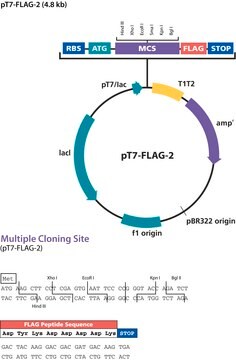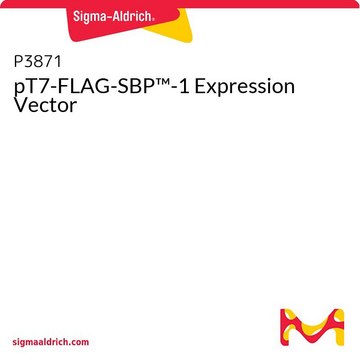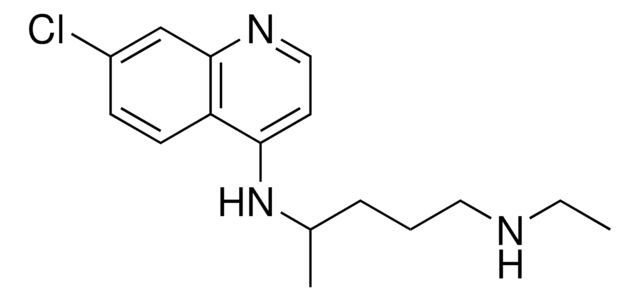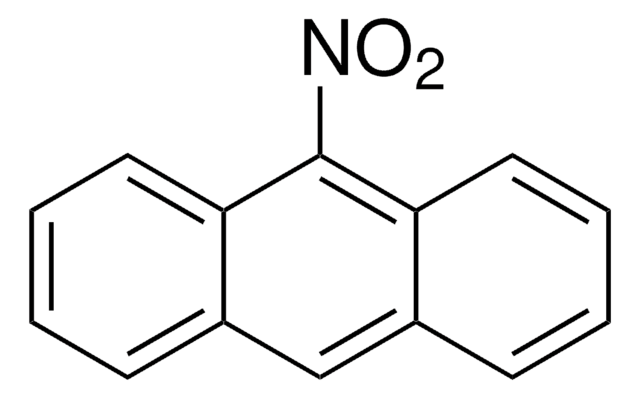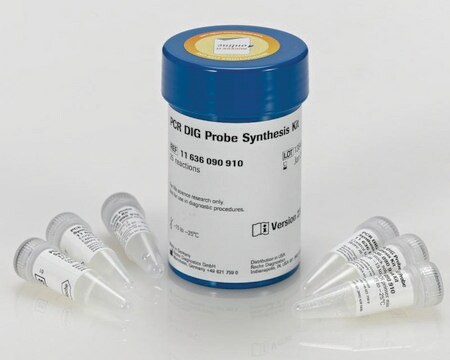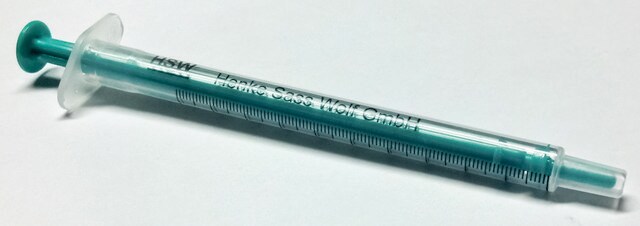PP2394
Bacterial FLAG® Tag Vector Set
plasmid vectors for molecular cloning
Sinônimo(s):
cloning vector, expression vector, molecular cloning vector, plasmid, plasmid vector, snapfast vector, vector
About This Item
Produtos recomendados
etiqueta
FLAG® tagged
forma
buffered aqueous solution
seleção de bactérias
kanamycin
Origem de replicação
pUC (500 copies)
clivagem do peptídeo
TEV
no cleavage
localização da etiqueta do peptídeo
C-terminal
N-terminal
Promotor
Promoter name: OXB20
Promoter activity: constitutive
Promoter type: bacterial
Condições de expedição
ambient
temperatura de armazenamento
−20°C
Descrição geral
This pack enables you to compare placing FLAG epitope tags at either the N or C terminus of your gene of interest (inserted into the MCS, under transcriptional control of the OXB20 strong bacterial promoter) with, and also without a TEV (Tobacco Etch Virus) protease cleavage site. The TEV site enables removal of the FLAG tag from the protein following production. Comparing these four configurations should enable you to evaluate how best to express and detect your gene of interest from bacterial cells. We also provide many other functional tags and cleavage sites, if required.This plasmid set has been designed to be compatible with a range of cloning techniques. The multiple cloning site contains a range of standard commonly used restriction sites for cloning. Using these sites genes can be inserted using standard cloning methods with DNA ligase. Other methods such as ligase independent cloning (LIC) Gibson Assembly InFusionHD or Seamless GeneArt can also be used and because all of our plasmids are based on the same backbone the same method can be used for cloning into all of our catalogue vectors.
Multiple cloning site notes: There are a few important sites within the MCS. These include the NcoI site the XbaI site and the BsgI and BseRI sites. The NcoI site contains a start codon that is immediately downstream of both a Kozak and Shine-Dalgarno ribosomal binding site. These allow for optimal positioning of genes when the start codon is placed in this location. If this is not required and you wish to use a downstream site for gene cloning you can remove the NcoI site by cleaving the plasmid with KpnI. The XbaI site contains a stop codon. This stop codon is positioned in a specific position in relation to the BsgI and BseRI sites that are immediately downstream. When either BseRI or BsgI cleave the plasmid they produce a TA overhang from the stop codon in the XbaI site that is compatible with all of our peptide tag plasmids cut with the same sites. BseRI and BsgI sites are non-palindromic and cleave a defined number of bases away from their binding site. Whenever we clone a gene into our multiple cloning site we always position the start and stop codon in the same positions in the MCS. If the start and ends of the genes are not compatible with NcoI and XbaI we extend the sequence to the nearest external sites but keep the start and stop codons locations consistent.
Transcription Termination: These plasmids contains three alternative transcription terminators for mammalian bacterial and bacteriophage (T7) expression. This means that only the promoter needs to be changed to alter the expression system you are using. We sell multiple promoters that can be used in each of these systems. The presence of each terminator does not reduce expression in the alternative systems.
Sequência
Nota de análise
Outras notas
Informações legais
Somente componentes do kit
- PSF-OXB20-NH2-FLAG®-TEV - N-TERMINAL FLAG® TAG BACTERIAL PLASMID, plasmid vector for molecular cloning
- PSF-OXB20-COOH-TEV-FLAG® - C-TERMINAL FLAG® TAG BACTERIAL PLASMID, plasmid vector for molecular cloning
produto relacionado
Código de classe de armazenamento
12 - Non Combustible Liquids
Ponto de fulgor (°F)
Not applicable
Ponto de fulgor (°C)
Not applicable
Certificados de análise (COA)
Busque Certificados de análise (COA) digitando o Número do Lote do produto. Os números de lote e remessa podem ser encontrados no rótulo de um produto após a palavra “Lot” ou “Batch”.
Já possui este produto?
Encontre a documentação dos produtos que você adquiriu recentemente na biblioteca de documentos.
Nossa equipe de cientistas tem experiência em todas as áreas de pesquisa, incluindo Life Sciences, ciência de materiais, síntese química, cromatografia, química analítica e muitas outras.
Entre em contato com a assistência técnica